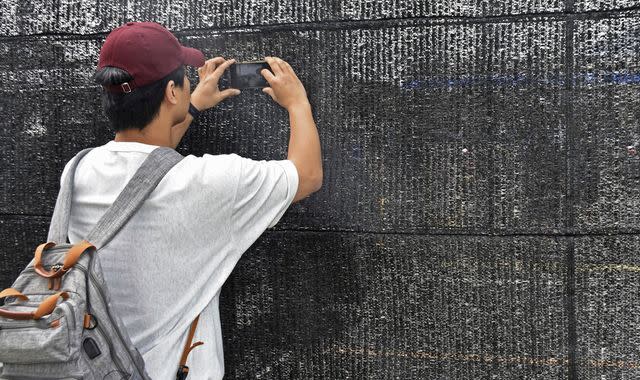Japan: Holes found in huge black screen put up to stop tourists taking photos of Mount Fuji

A Japanese town that put up a huge black screen to try to stop tourists taking photos of Mount Fuji has found holes in the material - with the openings said to be just the right size to fit a camera lens through.
Officials in Fujikawaguchiko, a popular spot for those hoping to photograph the mountain on the island of Honshu, installed the black mesh net last week in a bid to prevent overcrowding caused by tourism.
The town spent 1.3 million yen (£6,485) on the screen which is 8.2ft high (2.5 metres) and 66ft (20 metres) long.
However, a hole was discovered in the material the next day.
Japanese officials had found around 10 similar holes, all at eye level, and all apparently just the right size to fit a camera lens through, by this morning.
One especially popular viewing location is outside a Lawson convenience store, from where photos taken at a certain angle make it look as if Mount Fuji is sitting on top of the roof of the building.
Local residents have complained about visitors blocking the narrow pavement, walking into the busy road or standing on someone's property to get their shots, officials said.
Despite the holes, officials have said the net, which was installed along with additional fencing, has helped ease the pressures of overtourism in the town.
Overtourism refers to when those living in an area, or those visiting, feel the experience has become worse because of the amount of tourists there.
It's a problem all over the world, with many destinations putting measures in place to help limit the impact of visitors.
How are other countries tackling overtourism?
Venice in Italy has introduced a scheme where tourists have to pay a €5 fee (£4.25) to enter the heart of the island city on certain days in spring and summer.
The city is visited by an estimated 30 million tourists a year - putting a strain on historic infrastructure and reducing the quality of life for people who live there.
Read more:
Why 2024 could be the worst year ever for overtourism?
Popular global destinations which are trying to limit tourism numbers
Meanwhile, in the Canary Islands in Spain, officials are considering introducing stricter tourism rules amid simmering anger among locals who are worried about increasing visitor numbers.
Canary Islands president Fernando Clavijo said this month that although the region was a leading Spanish tourist destination, more controls were needed.
In April, thousands of people protested in Tenerife, calling for the Spanish island to temporarily limit tourist arrivals.
They want to dampen a boom in short-term holiday rentals and hotel construction which is driving up housing costs for locals.
It comes as parts of Machu Picchu in Peru, one of the world's most popular heritage sites, were temporarily closed to tourists last September.
Authorities took the decision amid growing concern over the deterioration of the site due to increasing footfall.
The site was built in the 15th century as a religious sanctuary for the Incas.


